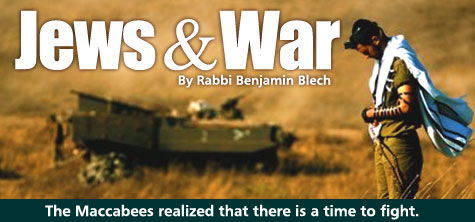 An Open Letter to University Presidents
An Open Letter to University Presidents


5 min read
The Maccabees realized that there is a time to fight.
The miracle of Hanukkah wasn’t performed by God alone. The Maccabees played a crucial role in defeating the Syrian Greeks on the battlefields. It was a partnership of human courage and Divine guidance. Matisyahu and his sons prevailed because they were wise enough to recognize that although Jews revere peace, we acknowledge that there may be a time that demands we go to war.
And that was not an easy thing for our people to admit – neither then, nor today.
Psychologists tell us there are basically two ways in which we can cope with the world: fight or flight. Encountering any difficulty, one can either attempt to cope, grapple and wrestle with an issue and overcome it, or one can flee and give up at the outset.
Some may rationalize flight as the correct religious response. Let me not do anything, and if God really desires a certain outcome, let Him handle it to His satisfaction.
As I heard Rabbi Soleveichik once explain it, this was the way of Jacob, even from the time he was in the womb. Jacob had actually been conceived first. He should’ve been the one to be born before his brother. Technically, he was the eldest, with all the attendant privileges of primogeniture. His brother Esau, however, pushed himself forward and forced himself over Jacob. “And after that came forth his brother and his hand had hold on Esau’s heel and his name was called Jacob” [Genesis 25:26] . The very name Jacob comes from the Hebrew word related to heel. Jacob was holding on to his brother’s heel; he begins his life being trampled upon, unfairly deprived by force of his rights.
Jacob’s life continued to unfold, guided by the unspoken philosophy that “nice Jewish boys don’t fight.” His twin brother Esau fooled father Isaac into thinking that he was the more pious and deserving son - and were it not for the intervention of his mother, Jacob would not have said a word in the face of this injustice.
When Jacob fell in love with Rachel only to have his father-in-law switch brides and trick him into a marriage with Leah, his response was to quietly accept the obligation to work for yet another seven years in order to earn the hand of the woman that was already rightly his.
Passivity in the face of evil and the silent acceptance of ill treatment defined Jacob’s theology. Jacob eventually realized his error in the dramatic story that so altered his perception that it was responsible for a change of name, a change that acknowledged that his newfound insight literally turned him into a new person.
Left totally alone and attacked by a mysterious assailant the commentators identify as the evil representative of Esau, Jacob realizes he has no alternative but to fight. At the end of a long night of battle, Jacob is left limping but nonetheless receives a blessing. He is now no longer the stepped-upon Jacob, but from this time forward is Israel – “because you have striven with God and with men and have prevailed” [Genesis 32:29].
Jacob may have suffered a blow, but he won the greater battle – the battle over his unwillingness previously to engage in combat. Jacob won the greatest victory of all – he finally managed to conquer himself.
And, explain the commentators, if he was left limping, what of it? That would simply mean he would never again be able to run away from anyone or any place, not even from himself.
The name change of Jacob to Israel differs from that of Abram to Abraham. Once Abram became Abraham he would never again be called by his original name. Abraham identified his new mission as “the father of many nations,” the first one to bring monotheism to the consciousness of the world. That name change was exclusive.
Peace is the ultimate goal. But until the messianic era, war remains an unfortunate necessity.
However even after Jacob became Israel, when the pacifist became the fighter, we still find him at times referred to by his earlier name. The reason is obvious. It is what was stated so beautifully by Solomon in the book of Ecclesiastes: “There is a time for peace and there is a time for war.” Both names are to be used, both modalities are to be employed.
Peace is the ultimate goal. But until the messianic era, war remains an unfortunate necessity.
We wish we would only have to imitate the way of Jacob who sat peacefully in his tent dedicating his life to study. But as long as there remain those like Esau who threaten our existence we know we must assume the identity of Israel and do battle with our enemies.
The Maccabees understood this. While they surely would have preferred to lead the peaceful life of priests, they recognized the responsibility placed upon them by the threat of a Greek-Syrian army bent on their destruction.
Of course nice Jewish boys don’t want to fight. That is not our way. But the world needs to know that we are the nation of Israel, defending the land of Israel. And like our forefather Israel, we will fight for survival. Like the Maccabees, Israel will go to war when it’s necessary. That’s because we love peace so much that we are ready to fight for it.
And that is one of the contemporary messages of Hanukkah.
